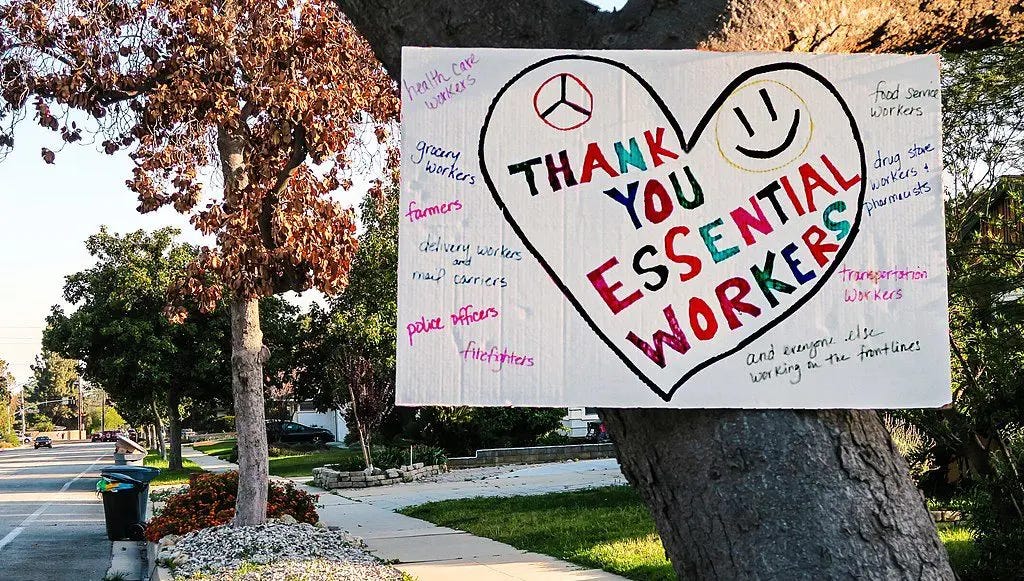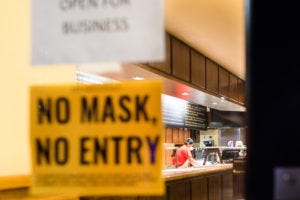Labeling Us ‘Essential’ or ‘Nonessential’ Makes Us Less Human
Pandemic Speak: Governments overstep their bounds when defining professions, businesses and even people
By Elise Amez-Droz
Before 2020, people didn’t think of their jobs as “essential” or “nonessential.” But the words are now part of our vocabulary, shaping our economy, laws and minds. This binary thinking—essential versus nonessential professions, businesses and even people—is here to stay, promising to deliver damage long after the race to vaccinate is over. We would once talk about “essential services” during disruptions caused by labor strikes, but the usage changed overnight with the advent of the COVID-19 pandemic. Governments took on the task of classifying activities as essential or nonessential, but it resembled more an exercise in creative writing than anything scientific. And it showed: states and cities came up with their own definitions. Liquor stores and cannabis dispensaries? Essential, perhaps because they eased the pain of the lockdowns and produced lots of government revenue. Elective surgery? Not essential: we need the doctors and nurses for COVID care. Veterinary care? It depends on where you live. Golf? It depends who you are. Even stranger have been the ups and downs of police officers. Last March they were celebrated as front-liners, along with health care workers and other first responders. Then they quickly fell out of favor after the killing of George Floyd in May as calls resounded to defund police departments. Now they’re back, ranking near the top of the priority list for vaccinations. Of course, hindsight is twenty-twenty. Governments had to do something in response to the pandemic. To safeguard public health, they needed to “slow the spread,” “flatten the curve” or “save lives,” and they believed that meant prioritizing certain activities and banning others. If policymakers had perfect knowledge, they would have devised foolproof plans. And perhaps the distinction between essential and nonessential could have allowed us to focus on what really matters: good health. Yet what we got was quite the opposite.
Image Credit: spurekar/Wikimedia Commons
If there is one thing the essential-nonessential distinction failed to protect, it was health. To be sure, we will never know what the U.S. death toll from COVID-19 would have been without restrictions, though the experience of places with few restrictions, such as Sweden and Florida, suggest that it would have been lower. But we do know how the “nonessential” designation affected our health.
For instance, we know that categorizing elective health care services as nonessential was a mistake. Cancers went undetected because tests were postponed, treatments for chronic illnesses were delayed and children weren’t being vaccinated when they should have. Many jurisdictions no longer ban “nonessential” care. In fact, the very governments that rushed to classify care as essential or nonessential are now—amid a far greater number of cases and in the face of a new, more contagious strain—pushing people to seek out health care services. But the damage is done: the public is now trained to think about care in essential versus nonessential terms. Whether an illness requires immediate intervention is best determined by a medical professional, but today everyone has a little doctor inside his or her head that performs this screening, on a largely unscientific basis. Closing businesses also affected people’s health. The objective was to protect health, but it was really to protect only against COVID-19. All other aspects of health seemingly fell out the window. While businesses sell many goods that don’t directly keep people healthy, the wages they pay their employees do. Every job is essential to at least one person: the jobholder. In any event, when a government scrutinizes the market, how can it possibly determine which of the endless goods and services on offer are essential? Governments are not good at outguessing the market, as the empty shelves in communist countries show. To highlight one example, a government-protected monopoly, AT&T, forced us to wait years to get basic telephone features such as caller ID and call-waiting, but the market quickly gave us smartphones with hundreds of features. When governments decide to intervene in the market, as they did last March, they inevitably put on a philosopher’s hat. Indeed, the term “essential” raises the questions: Essential to whom? Essential to achieving what? The pandemic wrecked the physical health of millions, but the business closures and government lockdowns have shattered the mental health of many more Americans. In a survey, 85% of physicians noted a drop in their patients’ mental health since the pandemic began, and almost a third observed a rise in addiction. A Gallup poll also showed significant drops in mental health, except for one category: people who attended religious services weekly—they saw their mental health improve. This antidote to deteriorating mental health was not available everywhere: At the beginning of the pandemic, 11 states and the District of Columbia banned religious services in person, deeming them “nonessential.” The governments’ urge to classify has led to something more damaging still: the application of “essential” or “nonessential” not just to professions, services and businesses, but also to people. “U.S. vaccine rollout’s next challenge: Verifying who is ‘essential,’” read a headline on the Reuters homepage two days before Christmas. After 10 months of crafting their definitions of essential, governments are now deciding which people should—and shouldn’t—receive the vaccine and in what order. Throughout the pandemic, health care workers were considered essential because they were caring for COVID-19 patients. Now people have something more effective to protect them than health care workers—the vaccine. Yet, the people getting top priority for vaccinations are not potential patients (unless they live in a nursing home) but health care workers, who usually belong to a demographic much less likely to die from the coronavirus than old or already-sick individuals. While politicians routinely exempt themselves from their own rules and corporations claim “essential” status on dubious grounds, there are millions of Americans who are still not permitted to do their “nonessential” jobs—in everything from food service to retail to the performing arts. But isn’t the fact that we have survived without those services proof that they are not essential? Survived, we have. But have we lived? People whose jobs were deemed essential have helped us survive, but we are social animals, with needs far more complex than the binary classification would have us believe, as seen in the Gallup poll. Fundamentally, designating someone or their job as essential or nonessential is within the realm of philosophy, not politics. Government shouldn’t have the authority to do this, and it certainly doesn’t have the ability to do this properly. When it ventures to do so, it decides what makes or breaks life, but that’s not its purpose. In an attempt to safeguard life during the pandemic, government on all levels found a new way to classify life, took away liberty and greatly hindered the pursuit of happiness. What is essential often eludes us. It may include love, family, friendship, purpose, dignity. By looking solely at our bodies and not our souls in their calculations and planning, governments throughout the country and across the world have showcased a dangerously narrow understanding of what makes us human.



